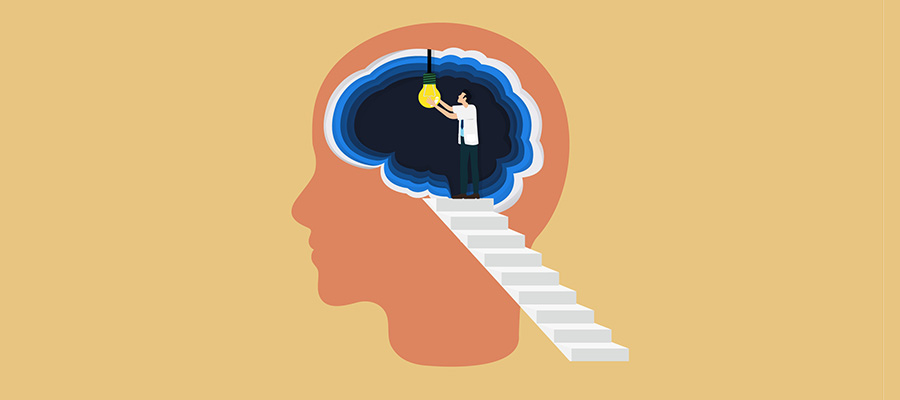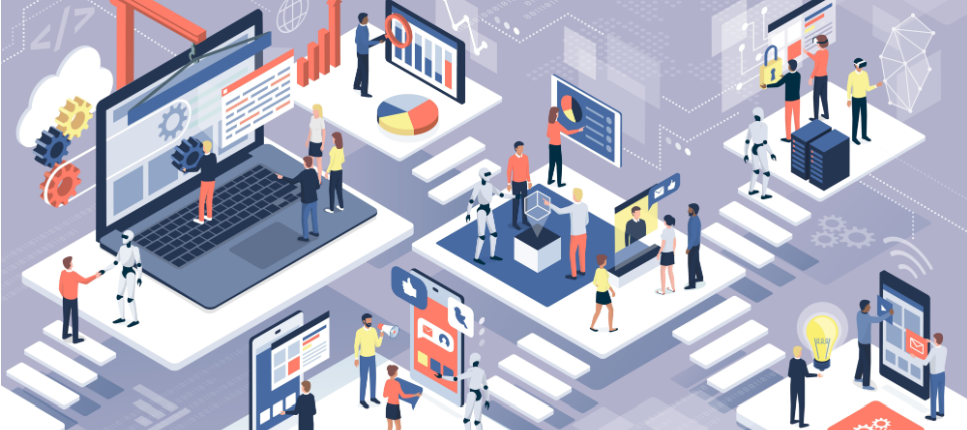Based on its etymology, metacognition can be summarized by the ability to go “beyond” (meta) the “act of learning” (cognition). We all take advantage of it daily, in a more or less conscious way. However, developing metacognition is one of the best ways to improve the quality of your learning, regardless of its nature, and the first relevant exercise in this regard is to become aware of this ability. Here are some ways to better understand it!
“Know thyself”
Some 500 years before our era, great thinkers were already juggling this notion of metacognition: it can be found in the motto “Know thyself” that Socrates made his own, as well as in this excerpt from the Confucius teachings: “You [a disciple], shall I teach you about knowledge? What you know, you know, what you don’t know, you don’t know. This is true wisdom.”
However, it was the American psychologist John H. Flavell who, in his research in the 1970s, was the first to name the notion of metacognition and to set out its theoretical foundations, which are still reflected upon today. For Flavell, metacognition “refers to one’s knowledge concerning one’s own cognitive processes or anything related to them. It also refers to the active control, regulation and orchestration of these processes” (Flavell cited by Doly, 1997). Several other academics then explored the notion and contributed to its understanding and possibilities.
Add to this the contribution of neuroscience, which has enabled us in recent years to deepen our knowledge of the brain. In addition to the fact that the “seat” of our metacognitive faculties is located in our frontal cortex, we now know that our “grey matter” is capable of certain plasticity, and this throughout our lives. We also know more about memory and the mechanisms of learning. These discoveries only reaffirm the relevance of continuing to explore our metacognitive potential!
Additional definitions
Here are three other generalist definitions that may complement Flavell’s 1976 definition:
Metacognition is…
→ a domain that includes: the introspective and conscious knowledge that a particular individual has of his or her own cognitive states and processes; the abilities that the individual has to deliberately control and plan his or her own cognitive processes in order to achieve a specific goal or objective. — Gombert, 1990
→ a mental process whose purpose is either a cognitive activity, a set of cognitive activities that the subject has just performed or is performing, or a mental product of these cognitive activities. Metacognition can lead to a judgment (usually not expressed) about the quality of the mental activities in question or their product and possibly a decision to modify the cognitive activity, its product or even the situation that caused it. — Christmas, 1997
→ the way a person views his or her mental approach for action in order to plan, evaluate, adjust and verify his or her learning process. — Deaudelin and Lafortune, 2001
From cognition to metacognition
- “Cognition” refers to all the processes related to our mental faculties: attention, reasoning, memorization, conceptualization, etc. It allows us to acquire information about our environment and to interpret it to regulate our behavior.
- The prefix “meta” not only means to go “beyond” (cognition), it also refers to reflection, participation, succession, and change.
- Metacognition is distinguished from cognition by the conscious or controlled nature of the processes involved as well as by the semantically penetrable aspect of the domain in question (Yzerbyt, Lories and Dardenne, 1998).
- Metacognition is not a simple action on cognition, but a process of reflection, verbalized or not, that the learner sets in motion when he or she perceives the environment as a problem to be solved. Through this process, the learner must also give meaning to the environment in question.
- Like cognition, however, metacognition involves not only our mental faculties but also our motivation and emotions.
Metacognition in bulk
- This ability allows us to identify our mistakes, our successes and to understand their origin.
- It develops from childhood, but it can be improved throughout our lives.
- It is mobilized as soon as we try to learn something new that goes beyond simple automatism; in other words, in any task that requires planning or self-reflection.
- It can involve both abstract and concrete tasks (called “manual”). In the latter case, to create a visual representation, we often give the example of the assembly of a piece of furniture in kit form, a task that requires us to reactivate our knowledge and skills in assembling furniture and to plan it, to a certain extent, to be able to carry it out (achieve a goal).
- It is sometimes associated with the idea of “learning to learn,” but it is more accurately summarized by a set of “cognitions about our cognitions” or by “knowledge of our own cognitive processes.”
- By developing our metacognitive skills, we can hope to improve the quality of our learning as well as our autonomy as learners, two significant assets for success in self-training and online learning.
Let’s break down the notion!
While several researchers have suggested throughout the years their interpretation of metacognition, we will limit ourselves here to presenting its components based on the main generalist definitions that have been formulated.
Metacognition consists of 3 components:
- Metacognitive knowledge
- Metacognitive strategies
- Metacognitive experiences
Metacognitive knowledge
This “knowledge” includes facts, but also beliefs and memories. They are not necessarily accurate and may be incomplete. Metacognitive knowledge, if it has the potential to help us achieve an objective, can therefore also hinder it.
They include what we know…
- Of oneself: the representations we make of our personality, our strengths, our weaknesses, our way of learning, etc.
- The task: the representations we make of the nature and context of the task, its requirements, its usefulness, etc.
- Cognitive strategies: what is known about the most effective methods for carrying out an activity
Metacognitive strategies
Also called metacognitive “competencies” or “skills,” these strategies are of two kinds and are carried out consciously. In the first place, we speak of metacognitive monitoring or follow-up and, in the second place, metacognitive control or regulation.
- Metacognitive monitoring is a self-observation process that consists of monitoring and evaluating our cognitive strategies to see if they are on track to achieve our goal.
- Metacognitive control is about taking action based on observations. This is where we determine if we need to modify our strategies and correct ourselves. Metacognitive control is also used to plan and manage the tasks to be performed.
Metacognitive experiences
As described by two theorists, metacognitive experiments are the “product of the cognitive monitoring process” (Büchel, 2013a; Efklides, 2001). They are made possible by linking knowledge and metacognitive strategies to achieve an objective. Emotions and motivation have a significant role to play in how we live our metacognitive experiences.
Related articles:
- Develop Your Metacognitive Skills
- 8 Types of Memory… to Remember!
- [INFOGRAPHIC] The Fascinating Brain: 5 Amazing Facts
- Education Through the Lens of Neuroscience
- Self-Training 101
- Self-Training: The Evolution of a Fundamental Concept
- [IN DEPTH ANALYSIS] The Importance of Emotions in Learning
- [INFOGRAPHIC] 7 learning myths debunked by neuroscience







Leave A Comment